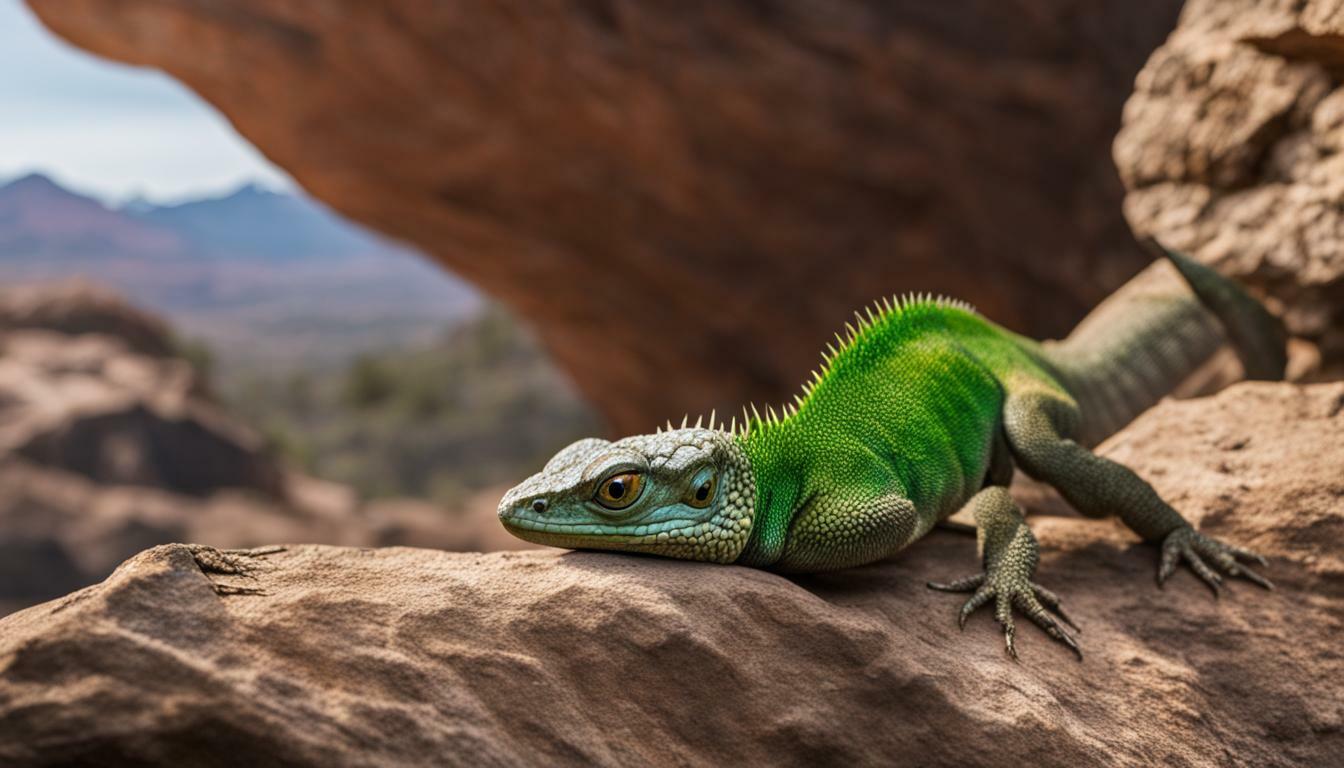Have you ever wondered if lizards have the capacity to feel emotions? This question has intrigued reptile enthusiasts and researchers alike. While it is difficult to fully understand the inner workings of a lizard’s mind, studies suggest that these remarkable creatures do display basic emotions. In this article, we will explore the emotional capabilities of lizards, the bonding and recognition they exhibit, and the fascinating dynamics within reptile families.
Key Takeaways:
- Lizards can experience basic emotions such as fear, aggression, and pleasure.
- Regular handling and feeding can help lizards recognize and bond with their owners.
- Some reptiles, like prehensile-tailed skinks and female alligators, form family groups and protect their young.
- While lizards may not form the same deep emotional connections as cats and dogs, they can still exhibit affection towards their owners.
- The study of lizard emotions provides fascinating insights into the complex world of reptile behavior.
The Emotional Capabilities of Lizards
Lizards, like other reptiles, do possess basic emotional capabilities. They may not exhibit emotions in the same way as mammals, but they can experience fear, aggression, and pleasure. When stroked or offered food, some lizards appear to show pleasure, suggesting a positive emotional response. This can be observed when they react to positive stimuli, such as being petted.
While it remains a topic of debate whether reptiles experience complex emotions like love, they do have the ability to recognize and form bonds with their owners. Regular handling and feeding play a crucial role in building these connections. Reptiles, such as lizards, have been known to exhibit recognition and familiarity towards their caretakers, indicating a form of emotional attachment.
| Reptile | Behavior | Emotional Intelligence |
|---|---|---|
| Prehensile-tailed skinks | Form family groups, protect young | Demonstrate care and protective instincts |
| Female alligators | Protect and tend to their nests | Show maternal behavior and bond with offspring |
However, it’s essential to understand that the emotional connections reptiles form may not be as deep as those seen in cats and dogs. While they can recognize their owners and exhibit positive responses, their emotional range may be more limited. It’s important for reptile owners to provide a suitable habitat, proper nutrition, and regular interaction to ensure their emotional well-being.
In conclusion, lizards, like other reptiles, have emotional capabilities. They can experience fear, aggression, and pleasure, and they have the ability to recognize and bond with their owners. While their emotional connections may not be as profound as those of mammals, understanding and respecting their emotional needs can contribute to their overall well-being.
Bonding and Recognition
Lizards have the capacity to recognize and form bonds with their owners. When handled and fed regularly, these reptiles can develop a level of trust and familiarity with their human caregivers. While it may not be the same as the deep emotional connections we experience with cats and dogs, the bond between a lizard and its owner is still significant.
Regular handling and interaction are crucial in establishing this bond. Lizards can become accustomed to their owner’s scent and touch, resulting in a level of comfort and recognition. They may even display behaviors that indicate their preference for their owner’s presence, such as approaching them or seeking their attention.
Additionally, feeding plays a vital role in building a bond with lizards. As these reptiles associate their owners with the regular provision of food, they can develop a positive association and form a connection based on trust. This bond can be particularly evident in reptiles that exhibit social behavior, such as prehensile-tailed skinks and female alligators, who actively protect their young and engage in family dynamics.
| Lizard Behavior and Emotions | Reptile Emotional Intelligence |
|---|---|
| Lizards can recognize their owners. | Lizards have the capacity to form bonds. |
| Regular handling and feeding are crucial. | Feeding plays a vital role in building trust. |
| Some lizards exhibit social behavior. | Prehensile-tailed skinks and female alligators protect their young. |
While the emotional capabilities of lizards may differ from those of more domesticated animals, it is clear that they possess the ability to recognize and bond with their human caregivers. These reptiles can demonstrate a level of trust, comfort, and familiarity with their owners through regular handling, feeding, and positive interactions. Understanding and respecting their unique emotional intelligence can lead to a rewarding relationship between lizards and their owners.
Family Dynamics in Reptiles
Some reptiles, such as prehensile-tailed skinks and female alligators, display family-oriented behavior and protect their young. These reptiles demonstrate a level of emotional intelligence that allows them to form social bonds and act in a nurturing and protective manner. For example, prehensile-tailed skinks are known to exhibit monogamous behavior, with males staying with their mates and helping to care for their offspring. Female alligators, on the other hand, are famously protective of their nests and will fiercely defend their young from potential threats.
In addition to their protective behavior, reptiles like prehensile-tailed skinks and female alligators also demonstrate parental care. They invest time and energy in ensuring the survival of their offspring, whether it be through incubating eggs, providing shelter, or teaching them survival skills. These displays of familial behavior suggest that reptiles possess a level of emotional connection and understanding that goes beyond simple instinctual responses.
Nesting and Reproduction
Reptiles have unique reproductive processes that contribute to their family dynamics. Female alligators, for instance, construct large mounds of vegetation and soil to create secure nesting sites for their eggs. They carefully regulate the temperature of the nest to ensure optimal conditions for the development of their offspring. Once the eggs hatch, the mother actively oversees the young alligators for an extended period, offering protection and guidance until they are capable of fending for themselves.
| Reptile | Family Behavior |
|---|---|
| Prehensile-tailed skinks | Monogamous behavior, males help care for offspring |
| Female alligators | Fiercely protect nests and provide parental care |
“The displays of familial behavior in reptiles like prehensile-tailed skinks and female alligators suggest a level of emotional connection and understanding that goes beyond simple instinctual responses.”
In conclusion, while reptiles may not form the same deep emotional connections as cats and dogs, they exhibit family-oriented behavior and protect their young. Some reptiles, such as prehensile-tailed skinks and female alligators, demonstrate a level of emotional intelligence that allows them to recognize and care for their offspring. Understanding these family dynamics in reptiles helps shed light on the complex emotional lives of these fascinating creatures.
Limitations of Emotional Connections
While lizards can form connections with their owners, their emotional capacity may differ from that of more domesticated animals like cats and dogs. Reptiles, including lizards, have basic emotions such as fear, aggression, and pleasure, but it is still a subject of debate whether they experience more complex emotions like love.
One of the limitations of emotional connections with lizards is that their expressions of affection may be more subtle compared to mammals. Lizards may not exhibit the same overt displays of love and attachment that we see in our pets. Instead, they may show their affection through behaviors like seeking out their owner’s company, allowing handling, or basking in the owner’s presence.
Additionally, lizards have different social structures and behaviors compared to cats and dogs. While reptiles like prehensile-tailed skinks and female alligators can form family groups and protect their young, their interactions may not involve the same level of emotional bonding seen in mammalian species.
In conclusion, while lizards can form connections with their owners, it is important to understand and appreciate the unique nature of their emotional capacity. By providing regular handling and feeding, reptile owners can build trust and create a positive bond with their lizard companions, even if it may not resemble the deep emotional connections we experience with more domesticated animals.
Conclusion
In conclusion, lizards do possess basic emotional capabilities, but their emotional connections may not be as profound as those observed in more domesticated animals. Reptiles, including lizards, demonstrate emotions such as fear, aggression, and pleasure. They can experience pleasure when stroked or offered food, and some lizards even seem to enjoy being petted. However, the extent to which reptiles experience emotions like love is still a subject of debate among scientists.
Despite this, lizards are capable of recognizing and bonding with their owners. Regular handling and feeding can help establish a bond between lizards and their human caregivers. Some reptiles, like prehensile-tailed skinks and female alligators, even exhibit family dynamics, displaying protective behaviors toward their offspring.
It’s important to remember that while lizards may have emotional capabilities, their emotional connections may not be as deep as those formed by cats and dogs. Reptiles have different social structures and behaviors, and their emotional experiences may be different from what we observe in more domesticated animals.
In summary, lizards do have feelings, but we should approach their emotional capabilities with an understanding of their unique nature as reptiles. Further research can shed more light on the emotional lives of these fascinating creatures, helping us better appreciate and care for them as pets.
FAQ
Q: Do lizards have emotions?
A: Reptiles, including lizards, do demonstrate basic emotions such as fear, aggression, and pleasure.
Q: Can lizards experience pleasure?
A: Yes, lizards may exhibit pleasure when stroked or offered food. Some lizards even appear to show pleasure when being petted.
Q: Do lizards form emotional connections with their owners?
A: While it is controversial whether reptiles experience emotions like love, they can recognize and bond with their owners who handle and feed them regularly.
Q: Do reptiles have family groups?
A: Yes, some reptiles, such as prehensile-tailed skinks and female alligators, form family groups and protect their young.
Q: Can lizards form deep emotional connections like cats and dogs?
A: Lizards may not form the same deep emotional connections as cats and dogs, but they can still exhibit some level of emotional recognition and bonding.
Are the Smells That Lizards Hate Also Harmful to Them?
Lizards’ aversions to certain smells is a fascinating topic. While some scents may repel lizards, it doesn’t necessarily mean that they are harmful to them. These aversions serve as a defense mechanism, deterring them from potential dangers or predators. It’s important to note that not all smells are harmful to lizards, but understanding their aversions can help create a more lizard-friendly environment.


One thought on “Uncovering the Truth: Do Lizards Have Feelings?”